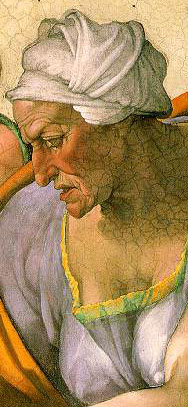only one beloved
My heart will never seek another heart,
Or smell another flower, knowing you.
Your love has made heart's field a desert waste;
No love other than yours grows in that place.
#954: From Rumi's Kolliyaat-e Shams-e Tabrizi
Search words: search, seek
I've become anxious about my son. I can see that he is restless and I can sense that he is on a search, seeking out a clue about his future. There are important decisions looming and this sets up a good deal of moodiness and uneasiness. He shoves me off, wants me to "go away". He is seeking himself, trying to see what he is to become. All of this is bothering me.
Rumi's verse expresses the classic romantic notion of a single love for eternity. Lovers sense that there is only one beloved, one particular beloved. Where this has been expressed as deity, the singleness of God has been most pronounced in Islam and the uniqueness most pronounced in God's incarnation as Jesus. We sense this so strongly when we lose a loved one (even a mere loved object). I am getting to know and love my new cat (now almost two years old) but I cannot fall in love with her because I am still grieving over the lost one. She will always be the first for she was the first pet we shared, my son and I. That is a place that cannot be taken by another. Whether the lost beloved was the first or the greatest or whatever, it was unique and irreplaceable in that sense. Rumi never found another Shams but he did develop close relations later with other male friends. The friendship was never the same. How could it be? I feel certain that he came to love what was unique in each new friend but Shams remained the prototype of male friendship for him.
Throughout our lives, we seek out ourselves, we seek to discover who we are. The seeking never stops because the "who we are" never stands still. It is the very seeking that moves us on toward the who we are to become. Sometimes we do get a good sense of it and that feels miraculous. To get a good sense of it in another is possibly even more miraculous. Through that perception, we become mirrors to one another and through that mutual understanding we can learn to develop that self knowledge and self understanding that is expressed as relationship with God. And God can be anything: a rock, a tree, a star, an animal, a young man or an old woman.

Michelangelo: The Cumaean Sibyl, Sistine Chapel ceiling @ artchive.com



0 Comments:
Post a Comment
<< Home